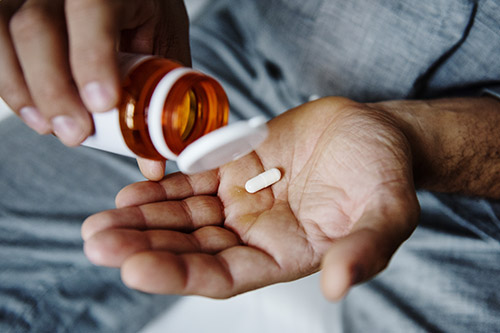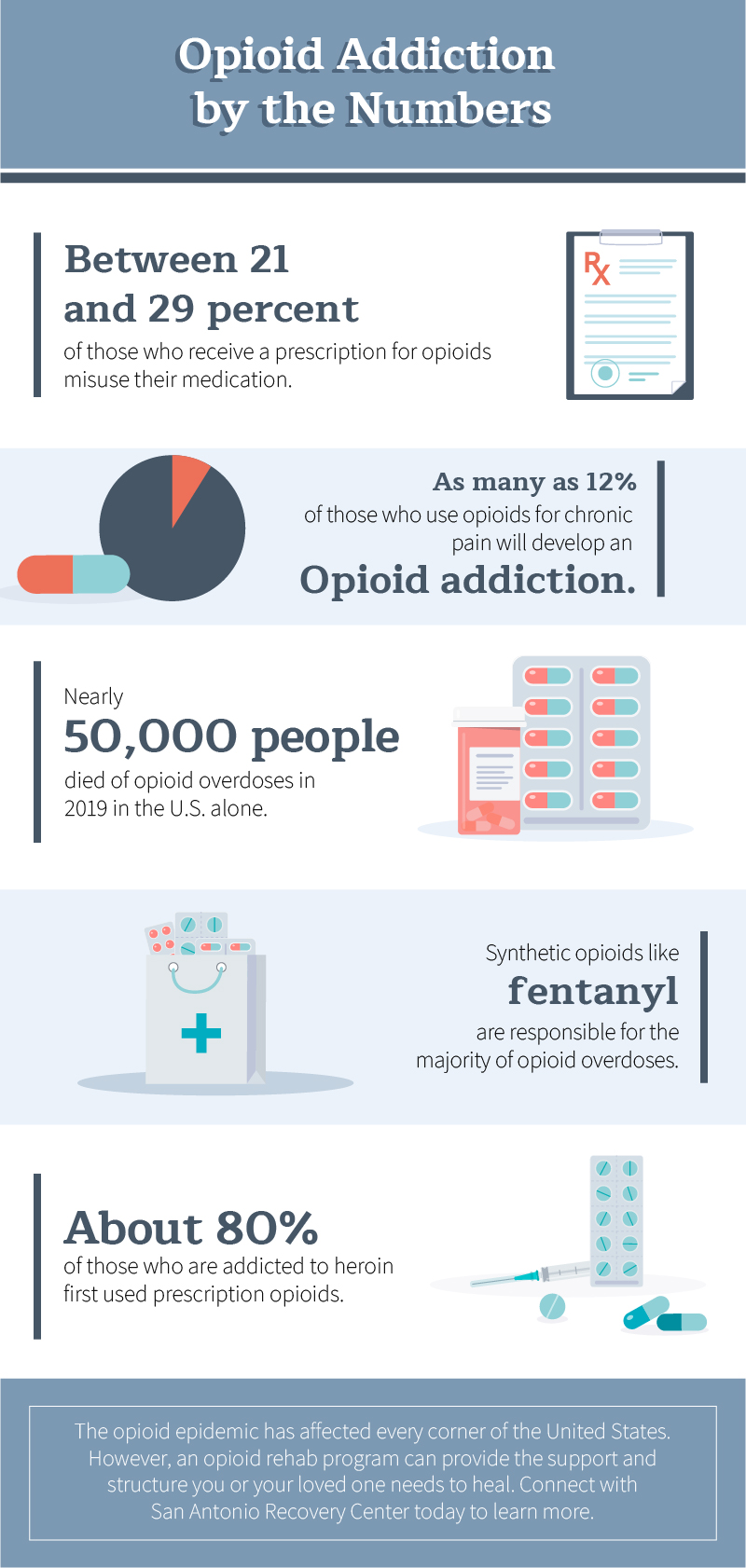
Opioids are highly addictive and can be incredibly dangerous. To overcome an addiction, you’ll need to have access to a wide range of treatment methods. There’s no miracle cure for addiction. Effective help requires comprehensive care. However, at San Antonio Recovery Center, we offer an opioid rehab program that can help you overcome an addiction to either prescription or illicit opioids. Our patients build a strong foundation for lifelong recovery through evidence-based and holistic therapies, activities and experiences, and medical care and medication as needed.
Learn more about our opioid rehab program and the individualized approach we take to treatment by connecting with a member of our team today at 866.957.7885 or by reaching out online. If you're ready to heal, San Antonio Recovery Center can help.
Opioids include both synthetic and naturally derived substances. Prescription opioids can be used to treat pain in individuals who are recovering from injury, illness, or medical procedures. While highly effective at treating pain, opioids are also incredibly addictive. Some of the most commonly prescribed opioid pain relievers include:
Some prescription opioids also contain acetaminophen. All opioids have the potential for misuse or abuse, and if you’ve been prescribed an opioid, be sure to follow your doctor’s instructions.
Illicit opioids include heroin, opium, and illicitly produced fentanyl. However, many individuals who struggle with opioid addiction obtain prescription opioids through friends or family members or by going to more than one doctor for a prescription, which is a practice known as doctor shopping.

For many, opioid addiction begins with a prescription for an opioid pain reliever. This medication might be used to treat chronic pain or acute pain after an injury or medical procedure. Opioids act on the reward centers of the brain and cause a rush of dopamine to be released. This can cause feelings of well-being or even euphoria in addition to relief from pain. Over time, the brain associates the substance with these good feelings. If you try to stop using the substance, you might experience cravings for it.
Over the course of an opioid addiction, chemicals from the drug causes the brain and body to adapt. At first, the body is unused to the opioid, allowing for quick and potent highs. Over time, however, the body adjusts, and it takes a higher dosage used more often to achieve the same high. As the body builds tolerance, the brain drives cravings, which in turn fuels the vicious cycle of addiction.

If you’re not sure whether an opioid rehab program would be the right fit for you, consider the following:
If you can answer “yes” to any of the above, San Antonio Recovery Center can help. From detox to aftercare, we provide care and support at every stage of recovery.
When a physical dependency is unfulfilled, the affected person undergoes opioid withdrawal. Withdrawal is particularly severe for heavy users and users of alcohol, heroin, and benzos. This severity is dangerous not only to a person’s health but to their recovery. If a person undergoes withdrawal but has access to opioids, the urge to relapse will be very strong. Withdrawal is the first, and perhaps the most difficult, challenge on the road to recovery.
Detox starts with withdrawal, lasting anywhere from a few hours to a couple of days. The benefit of opioid detox is that it takes place in a secure, medically monitored environment. Some withdrawal symptoms, like seizures or delirium tremens (for alcoholics), can be fatal if left untreated. Medical professionals monitor detox patients 24/7 to keep them comfortable and safe as their body purges the addictive substance.
After detox, residential and outpatient programs help those in recovery build the healthy coping skills they need for long-term recovery. The journey to recovery does not end after these programs are completed.
Addiction is far from simply physical. However, many clients need to find physical stability before working toward recovery. To help, pharmacological treatment is sometimes necessary.
It’s impossible to get safe pharmacological treatment at home. Even if you stay committed to recovery, you won’t know which medications are safe to take following opioid abuse. Therefore, it’s vital to have medical professionals supporting you every step of the way. Overall, with the right medical care, you’ll be safer, healthier, and better equipped to fight for lifelong sobriety.
Opioid addiction treatment is unique to everyone. For those struggling with addiction, good mental health is the key to lasting sobriety. Thus, dual diagnosis programs are extremely important. Many people thrive during recovery thanks to co-occurring disorder treatment.
If mental health and substance abuse disorders are simultaneously present, medical professionals should treat both at the same time. Ignoring one in order to treat the other only makes a recovery harder and could lead to a relapse.
If staff prioritize treating the addiction while ignoring mental health, relapse is more likely. Bipolar disorder, anxiety, or depression could become such a problem that substance abuse is the only relief available. However, when treating mental health and addiction simultaneously, clients stay strong and continue working toward lifelong recovery.
Some of the most effective forms of addiction treatment involve others. You can’t overcome addiction alone. Having the support of friends and family goes a long way.
Often, family members have good intentions and want to help. Through family therapy, you’ll be able to communicate better with loved ones. During these sessions, family members can rebuild relationships damaged by addiction.
Additionally, in group therapy, clients can share experiences with like-minded peers. They can open up and become vulnerable without fear of judgment. The bonds made in group therapy can be strong, and it’s not unusual for them to last for years.
Changing behavior can go a long way in overcoming addictive habits. One way to fight back against the opioid epidemic is with behavioral treatments. Both cognitive and dialectical behavioral therapy can help.
Behavioral therapy is about regulating emotions and replacing bad habits with healthy ones. Additionally, it can get rid of black and white thinking, which often leads to self-sabotage. Behavioral therapy also boosts self-confidence and helps clients see themselves in a positive light.
At San Antonio Recovery Center, clients will have access to a wide range of treatment methods. Based on the 12-step program philosophy, treatment methods are comprehensive and tailored to each individual’s needs. During treatment, clients can expect all of the following:
Opioid addiction treatment is widely available, but not all programs are equal. At San Antonio Recovery Center in Texas, you’ll have access to evidence-based treatment to fight back against opioid addiction. For the opportunity for lasting recovery, call 866.957.7885 or reach out online today and get on track to lifelong health.
contact us now!
